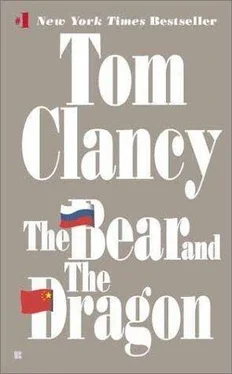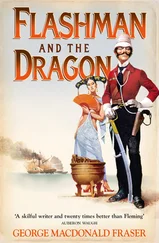Tom Clancy - The Bear and the Dragon
Здесь есть возможность читать онлайн «Tom Clancy - The Bear and the Dragon» весь текст электронной книги совершенно бесплатно (целиком полную версию без сокращений). В некоторых случаях можно слушать аудио, скачать через торрент в формате fb2 и присутствует краткое содержание. Год выпуска: 2001, ISBN: 2001, Жанр: Триллер, на английском языке. Описание произведения, (предисловие) а так же отзывы посетителей доступны на портале библиотеки ЛибКат.
- Название:The Bear and the Dragon
- Автор:
- Жанр:
- Год:2001
- ISBN:780425180969
- Рейтинг книги:3 / 5. Голосов: 1
-
Избранное:Добавить в избранное
- Отзывы:
-
Ваша оценка:
- 60
- 1
- 2
- 3
- 4
- 5
The Bear and the Dragon: краткое содержание, описание и аннотация
Предлагаем к чтению аннотацию, описание, краткое содержание или предисловие (зависит от того, что написал сам автор книги «The Bear and the Dragon»). Если вы не нашли необходимую информацию о книге — напишите в комментариях, мы постараемся отыскать её.
The Bear and the Dragon — читать онлайн бесплатно полную книгу (весь текст) целиком
Ниже представлен текст книги, разбитый по страницам. Система сохранения места последней прочитанной страницы, позволяет с удобством читать онлайн бесплатно книгу «The Bear and the Dragon», без необходимости каждый раз заново искать на чём Вы остановились. Поставьте закладку, и сможете в любой момент перейти на страницу, на которой закончили чтение.
Интервал:
Закладка:
The one thing to remember was that the informants were criminals, and hence unreliable in many things, too given to lying, exaggeration, to making up what they thought their master wanted to hear. And so Shablikov had to be careful believing anything this criminal said.
For his part, Pavel Petrovich Klusov had his own doubts, dealing as he did with this corrupted police colonel. Shablikov was not a former KGB officer, but rather a career policeman, and therefore not as smart as he believed himself to be, but more accustomed to bribes and informal arrangements with those he pursued. That was probably how he had achieved his fairly high rank. He knew how to get information by making deals with people like himself, Klusov thought. The informant wondered if the colonel had a hard-currency account somewhere. It would be interesting to find out where he lived, what sort of private car he or his wife drove. But he’d do what he was told, because his own “commercial” activities thrived under Shablikov’s protection, and later that night he’d go out drinking with Irina Aganovna, maybe take her to bed later, and along the way find out how deeply mourned Avseyenko was by his … former … employees.
“Yes, Comrade Polkovnik Leytnant,” Klusov agreed. “It will be as you say. I will try to be back with you tomorrow.”
“You will not try. You will do it, Pasha,” Shablikov told him, like a schoolmaster demanding homework from an underachieving child.
It is already under way,” Zhang told his Premier.
“I trust this one will go more smoothly than its two predecessors,” the Premier replied dryly. The risks attached to this operation were incomparably greater. Both previous times, with Japan’s attempt to drastically alter the Pacific Rim equation, and Iran’s effort to create a new nation from the ashes of the Soviet Union, the People’s Republic had not done anything, just … encouraged, behind the scenes. This venture, though, was different. Well, one could not really expect great things to happen on the cheap, could one?
“I-we have been unlucky.”
“Perhaps so.” A casual nod as he switched papers on his desk.
Zhang Han San’s blood went a little cold at that. The Premier of the People’s Republic was a man known for his detachment, but he’d always regarded his Minister Without Portfolio with a certain degree of warmth. Zhang was one of the few whose advice the Premier usually heeded. As indeed today the advice would be heeded, but without any feeling on the part of the senior official.
“We have exposed nothing and we have lost nothing,” Zhang went on.
The head didn’t come up. “Except that there is now an American ambassador in Taipei.” And now there was talk of a mutual-defense treaty whose only purpose was to place the American navy between the two countries, regular port visits, perhaps even a permanent base (to be built entirely, most certainly, from Taiwanese money) whose only purpose, the Americans would innocently say, was merely to be a replacement for Subic Bay in the Philippines. The economy on Taiwan had exploded after the renewal of full U.S. diplomatic recognition, with an influx of massive new capital investments from all over the world. Much of that money would-and should -have come to the PRC, except for the change in America’s outlook.
But the American President Ryan had taken his action entirely on his own, so the intelligence services claimed, contrary to political and diplomatic advice in Washington-though the American Secretary of State, that Adler man, had reportedly supported Ryan’s foolish decision.
Zhang’s blood temperature dropped another degree or so. Both of his plans had gone almost as he’d calculated they should, hadn’t they? In neither case had his country risked anything of consequence-oh, yes, they’d lost a few fighter aircraft the last time around, but those things and their pilots regularly crashed to no purpose anyway. Especially in the case of Taiwan, the People’s Republic had acted responsibly, allowing Secretary Adler to shuttle directly back and forth between Beijing and its wayward province across the Formosa Strait, as though giving them legitimacy-something obviously not intended by the PRC, but rather as a convenience to aid the American in his peacemaking task, so as to appear more reasonable to the Americans … and so, why had Ryan done it? Had he guessed Zhang’s play? That was possible, but it was more likely that there was a leak, an informer, a spy this close to the summit of political power in the People’s Republic. The counterintelligence agencies were examining the possibility. There were few who knew what emerged from his mind and his office, and all of them would be questioned, while technical people checked his telephone lines and the very walls of his office. Had he, Zhang, been in error? Certainly not! Even if his Premier felt that way … Zhang next considered his standing with the Politburo. That could have been better. Too many of them regarded him as an adventurer with too great an access to the wrong ear. It was an easy thing to whisper, since they’d be delighted to reap the profits from his policy successes, and only slightly less delighted to pull away from him if things went awry. Well, such were the hazards of having reached the summit of policy-making in a country such as his.
“Even if we wished to crush Taiwan, unless we opted for nuclear weapons, it would require years and vast amounts of treasure to construct the means to make it possible, and then it would be a vast risk to little profit. Better that the People’s Republic should grow so successful economically that they come begging to us to be let back into the family home. They are not powerful enemies, after all. They are scarcely even a nuisance on the world stage.” But for some reason, they were a specific nuisance to his Premier, Zhang reminded himself, like some sort of personal allergy that marked and itched his sensitive skin.
“We have lost face, Zhang. That is enough for the moment.”
“Face is not blood, Xu, nor is it treasure.”
“They have ample treasure,” the Premier pointed out, still not looking at his guest. And that was true. The small island of Taiwan was immensely rich from the industrious effort of its mainly ethnic-Chinese inhabitants, who traded nearly everything to nearly everywhere, and the restoration of American diplomatic recognition had increased both their commercial prosperity and their standing on the world stage. Try as he might, wish as he might, Zhang could not discount either of those things.
What had gone wrong? he asked himself again. Were not his plays brilliantly subtle ones? Had his country ever overtly threatened Siberia? No. Did even the People’s Liberation Army’s leadership know what the plans were? Well, yes, he had to admit to himself, some did, but only the most trusted people in the operations directorate, and a handful of senior field commanders-the ones who would have to execute the plans if the time ever came. But such people knew how to keep secrets, and if they talked to anyone … but they wouldn’t, because they knew what happened to people who spoke of things best left unspoken in a society such as theirs, and they knew that the very air had ears at their level of “trust.” They hadn’t even commented on the draft plans to anyone, just made the usual adjustments in the technical arrangements, as senior officers always tended to do. And so, perhaps some file clerks had the ability to examine the plans, but that was exceedingly unlikely as well. Security in the PLA was excellent. The soldiers, from private to the lower general ranks, had no more freedom than a machine bolted to the factory floor, and by the time they reached senior rank they’d mainly forgotten how to think independently, except perhaps in some technical matters, like which sort of bridge to build over a particular river. No, to Zhang they might as well have been machines, and were just as trustworthy.
Читать дальшеИнтервал:
Закладка:
Похожие книги на «The Bear and the Dragon»
Представляем Вашему вниманию похожие книги на «The Bear and the Dragon» списком для выбора. Мы отобрали схожую по названию и смыслу литературу в надежде предоставить читателям больше вариантов отыскать новые, интересные, ещё непрочитанные произведения.
Обсуждение, отзывы о книге «The Bear and the Dragon» и просто собственные мнения читателей. Оставьте ваши комментарии, напишите, что Вы думаете о произведении, его смысле или главных героях. Укажите что конкретно понравилось, а что нет, и почему Вы так считаете.






![Александр Ирвин - Tom Clancy’s The Division 2. Фальшивый рассвет [litres]](/books/417744/aleksandr-irvin-tom-clancy-s-the-division-2-falsh-thumb.webp)




